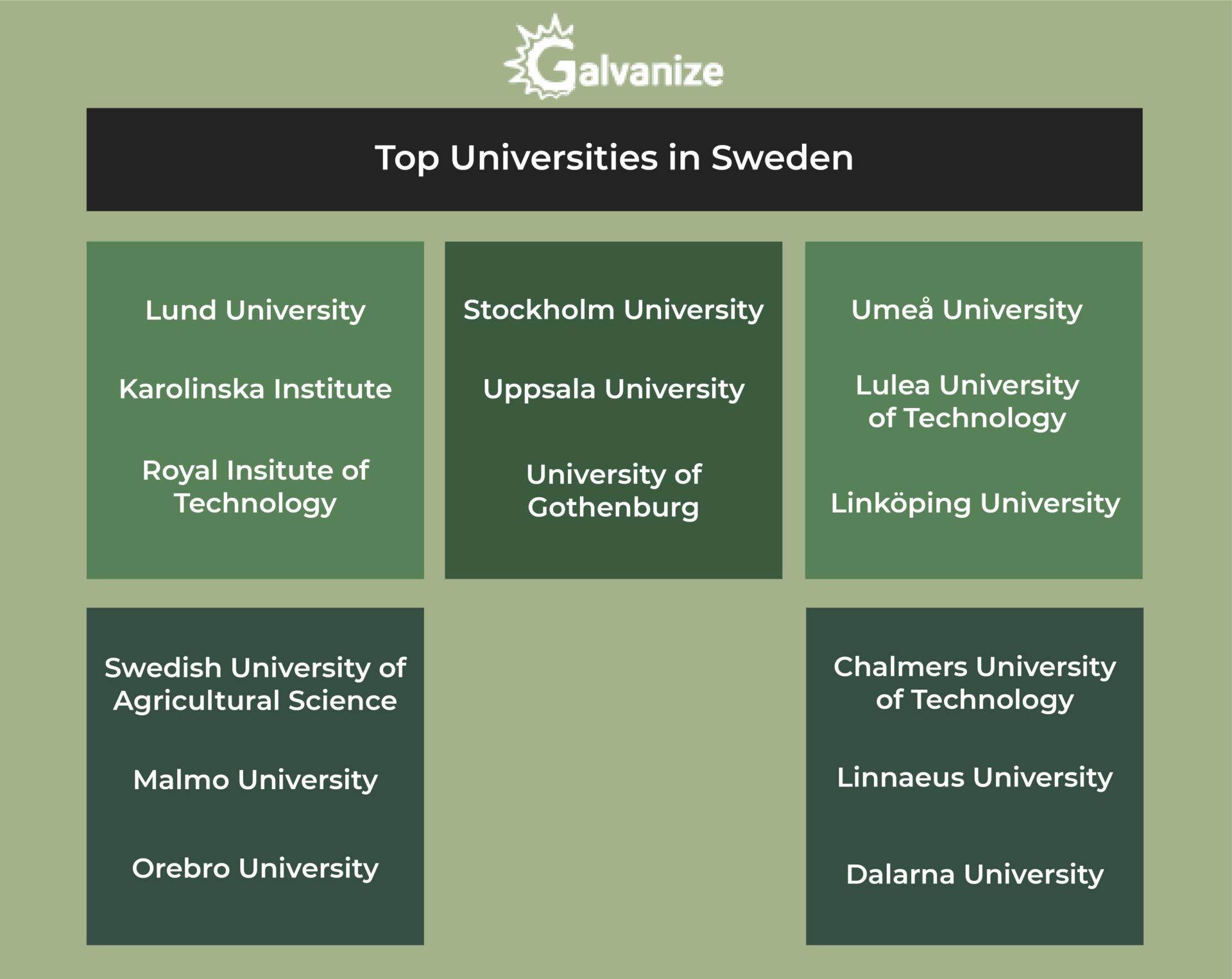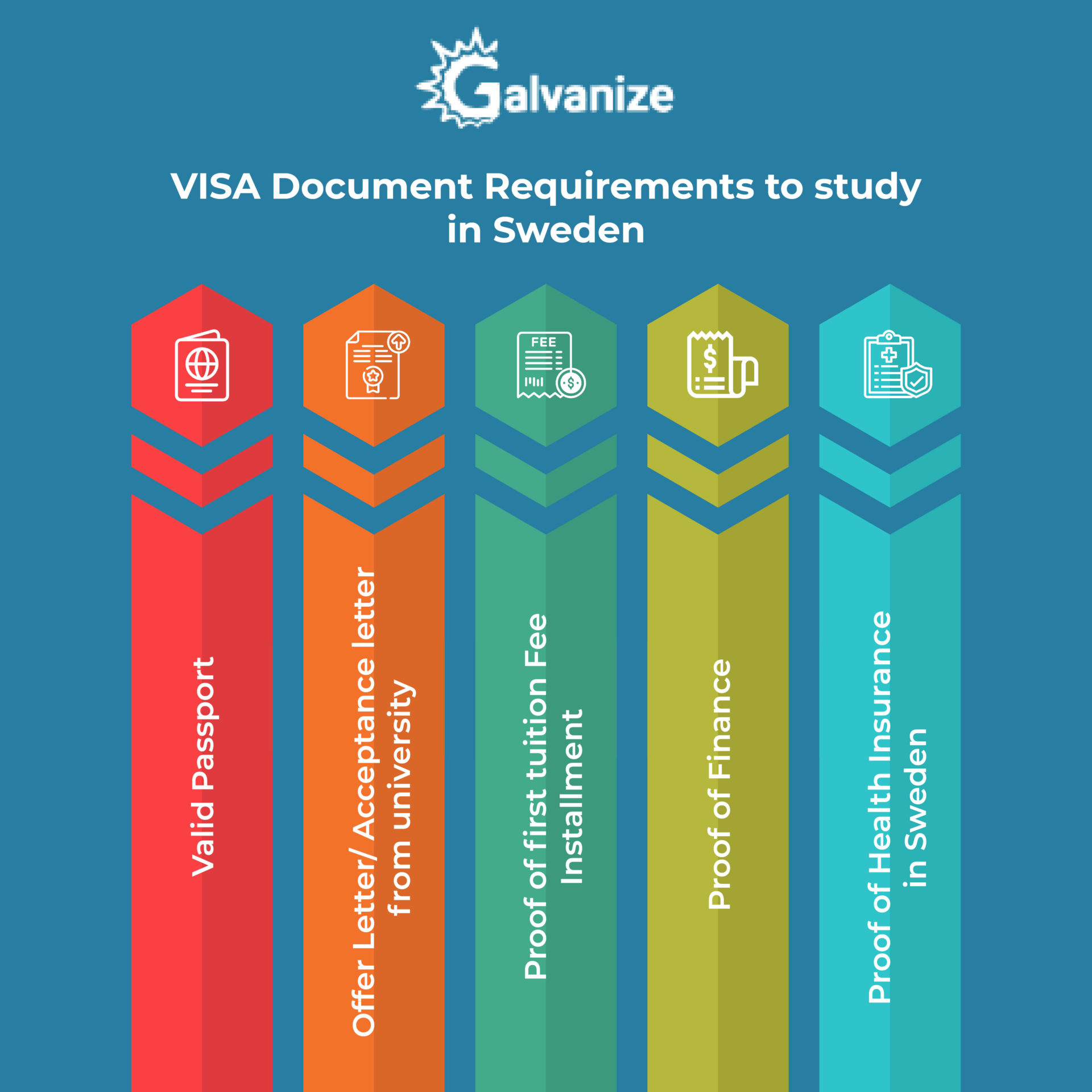
A Complete Guide To
Study in Sweden
Do you aspire to pursue your dreams of studying in Sweden soon?
You are in the right place. This blog discusses in detail about all the details that’s required to get a clear idea of what’s needed and which university to go to for your specific field of interest
Table of Contents
-
Chapter 1: Why Study in Sweden?
-
1) Impact of Coronavirus on higher education in Europe – safe or not?
2) Why you should apply to universities in Sweden
2.1) Pros of studying in Sweden
2.2) Who is Sweden not for?
3) Is Sweden safe for Asian and African students
4) Salary and employment opportunities in Sweden
-
Chapter 2 What are the requirements to Study in Sweden?
-
5.1) Bachelors requirements
-
5.2 ) Master’s requirements
-
5.3) Phd Requirements
-
Chapter 3 : Top Universities and Scholarships
-
6) Closer look at the top programs
6.1) Top universities
6.2) Low tuition Universities in Sweden
7) Top Scholarships in Sweden
-
Chapter 4 Application Process and Expenses for Study in Sweden
-
8) Application Process and Expenses in detail
8.1) Document Checklist
8.2) Tuition and living expenses
8.3) Courses and Tuition Fees
-
Chapter 5 VISA and Application
-
9) Visa – Final Step
9.1) Process for VISA Application
9.2) VISA documents
9.3) Application and Documents for Work Permit
Chapter 1
CHAPTER 1 : WHY STUDY IN SWEDEN
1) Impact of Coronavirus on higher education in Europe - safe or not?
Some Effects that we saw in 2020:
No face-to-face teaching or exams: Classes resume online to reduce the spread of the virus across the country. Exams postponed or held in different ways.
Restrictions on immigration: Many countries are restricting international travel. Only nationals or permanent residents are allowed in, save for important exceptions.
Eligibility for admission: Delays in earning your high school diplomas or college degrees can affect your ability to meet the minimum eligibility requirements.
Admission procedures and application deadlines: Universities may temporarily change their admissions processes and postpone application deadlines or semester start dates.
Looking Ahead to 2021
- Some clinical trials in Phase 1 have reported positive results towards the development of a Covid 19 vaccine.
- Sweden launched a Coronavirus stimulus package of 300 billion Swedish crowns ($30.94 billion) to help boost the economy.
- Countries are starting to re-open businesses in a phased manner as they get better at social distancing, detecting Covid-19 patients through increased testing, and ramping up healthcare systems.
2) Why should you apply to universities in Sweden?
- Modern-day Sweden is known for its sense of social justice and fairness.
- Highest level of wealth equality in the world.
- One of the world’s lowest gender pay gaps.
- Publicly funded healthcare for all citizens.
- An economy driven by science and technology.
- There are 14 public universities and 17 public colleges in Sweden and a number of private institutions of higher education, like Stockholm School of Economics, Chalmers University of Technology in Gothenburg, and Jönköping University.
- Swedish universities regularly place highly in global rankings.
2.1) Sweden- Pros of Studying
- Creativity is central: You’re encouraged to think independently, creatively, and critically. Independence of mind and freedom of speech are two of the reasons why Sweden ranks among the world’s most innovative nations. The education system in Sweden is different from the ones we see in India and many other Asian countries, which focus more on grunt work and the ability to work harder and longer. In comparison, Sweden is known for its creative work.
- Coursework is challenging – in a good way: Sweden has a long and proud history of academic excellence, despite its relatively small population. You’ll find a focus on rationality, reason, and knowledge application so that it makes a real difference.
- Sustainability and the environment are in focus: Environmental issues are a high priority in Sweden, which has been named the most sustainable country in the world for its use of renewable energy. Sweden is aiming for 100 percent renewable energy production by 2040.
- Equality and diversity are central to Swedish society:
During your studies, you’ll learn how to balance different interests, needs, and ideas to bring out the best in everyone and solve complex issues as a team – vital skills for your global career, where teamwork across cultures is the norm.
- You’ll learn skills for a global career:
Many degree programs in Sweden include internships, which are a great way to get real-world experience while building your professional network. If you’re interested in research, pursuing a master’s in Sweden can be a great way to make contacts to carry on and do a Ph.D.
6. Bonus: Life in Sweden is international student-friendly. English is an important foreign language. Transport is reliable and efficient, and most international students can work. After completing your studies, you can apply to extend your residence permit to search for work for up to six months.
2.2) Who is Sweden not for?
Students coming from developing countries might find the expenses to be quite high. Sweden does charge a tuition fee for international students who are also faced with the added problem of accommodation/apartment hunting in Sweden, which can be pretty challenging and expensive. Since the word “expensive” might differ from one to another, here’s an example: The average rent in Sweden is close to $1000.
The climate in Sweden can be really cold all around the year, except for a few months of summer. While many of us from developing countries do not mind extreme weather conditions, you might want to think again before coming to Sweden. Winter can be extremely dark and cold, unlike many other countries.
Part-time jobs can be very competitive in Sweden even though the pay is quite decent. Then again, the money one would earn from part-time jobs would be spent entirely on rent and food, provided one gets the job.
Apartment hunting can be very hard in Sweden since many flats are too old and overpriced. This is one of the common concerns among people who have relocated to Sweden.
In conclusion, if you are financially stable and can manage your expenses throughout your studies, and if you don’t mind the dark winter cold, then Sweden is an excellent option for you.
3) Is Sweden safe for asian and african students
Sweden is considered a very safe country for international students in general. Acts of crime against Asians and Africans have been low, and people are generally polite and respectful.
But no matter which country you go to, there will be some people who are not very fond of immigrants. You are bound to face some level of racism everywhere. But overall, safety is guaranteed when it comes to studying in Sweden for international students.
4) Salary and employment opportunities in Sweden
The first thing that comes to our mind when we think about studying abroad or settling in a particular country is this:
What is the salary range I can expect in this country for my career line?:
Here’s the general salary range that one can expect in Sweden annually: 136,800 SEK (lowest average) to 2,412,000 SEK (highest average).
This would convert to 16,450 USD (lowest average) to 290,000 USD (highest average)
The median salary in Sweden is 61,200 USD. This means that more than 50% of the Swedish population earns less than this amount.
But again, salary relies on two factors:
- Your career line
- Years of experience
Also, do note that the annual salary increment in Sweden is around 6% on average.
But it would be best not to concern yourself too much with these details. You can get substantial salary hikes in your company, provided it is a startup with a lot of incoming investment, and you are one of the major contributors to the company.
The business landscape is rapidly changing, so worrying about increments would be unnecessary.
SWEDEN SALARY CALCULATOR:
Here’s a salary calculator for your specific job role: https://teleport.org/cities/stockholm/salaries/
Note: Taxes in Sweden can be over 30% for moderate salaries, and it can be over 50% if your salary crosses a certain limit. This number changes periodically, so it’s better for you to check at the time of your relocation.
EMPLOYMENT OPPORTUNITIES IN SWEDEN:
Job hunting can be difficult in Sweden, but the salaries are high, and the work culture is said to be hospitable and highly collaborative.
- As a foreigner, your chances of landing a job would increase if you know and understand the language well.
- The Swedish company who might hire you would have to explain why they hired an expatriate over a native Swede, and hence, you would have to stand out in one way or another.
- The most popular websites in Sweden for job hunting are indeed.com, metro job, and Linkedin.
- It is recommended to have a Swedish version of your resume and CV even if you are only applying for English-speaking jobs. Also, remember to stick a passport-sized photo of yourself in the top right corner of the resume.
- Work culture in Sweden is pretty informal, yet you would have to go in formal attire when attending interviews.
- According to a survey, 6/10 times informal networking helped land a job rather than the traditional route. So start networking soon. Start here.
In-Demand Jobs in Sweden:
- pharmacist
- senior high school teacher
- civil, mechanical, and electrical engineers
- chemists
- vocational teachers
- software and system developers
- dentists, doctors, and nurses
University professors: http://www.salaryexplorer.com/salary-survey.php?loc=209&loctype=1
Study in Sweden Guide
Chapter 2
Requirements to study in Sweden
5.1) Bachelor's requirements
The requirements for a bachelor’s program in a Swedish university are pretty simple and straightforward.
- The student must have graduated high school with 60% marks and must have completed the age of 18 before enrolling in a degree program.
- Prove your English proficiency: The English language general requirements are studies that are equivalent to Swedish upper secondary English Course 6.
- Students must have completed courses in mathematics equivalent to the level of maths taught at Swedish universities; approximately ten years of mathematics study.
This just means that you need to take an internationally recognized English proficiency test like IELTS or TOEFL and make sure it meets the requirements for the branch and university you are applying to.
5.2) Masters requirements
Entry requirements for getting a master’s degree from a Swedish university is as follows:
- Must have completed a bachelor’s degree from an internationally recognized university or a degree equivalent to the Swedish Kandidatexamen.
- English proficiency: Get a good IELTS or TOEFL score.
5.3) PHD Entry requirements
Entry Requirements for a Ph.D. from a Swedish university is as follows:
- The previous degree completed must be in the same field of study.
- The applicant must also submit the thesis submitted in the previous degree along with the application.
- Might require proficiency in both English and Swedish language since some seminars could be conducted in Swedish.
Why Choose Galvanize Admission Counselling?
Chapter 3
TOP UNIVERSITIES AND SCHOLARSHIPS IN SWEDEN
6) Closer look at the top programs in Europe
Most popular programs below:
- Masters Computer Science
- Masters Information Technology
- Masters Management
- Masters Mechanical Engineering
- Biotechnology & Biomedical Sciences
- Masters Information Systems
- Masters Data Science
- Masters in Applied Artificial Intelligence and Data Analytics
- Masters Artificial Intelligence for Games
- Masters in Business Analytics
- Renewable Energy & Sustainability
6.1) Top Universities in Sweden
- Karolinska Institute
- Lund University
- Uppsala University
- Stockholm University
- University of Gothenburg
- Royal Institute of Technology
- Umeå University
- Linköping University
- Swedish University of Agricultural Sciences
- Chalmers University of Technology
- Orebro University
- Lulea University of Technology
- Malmo University
- Linnaeus University
- Dalarna University
6.2) Low Tuition Fee Universities in Sweden:
Now, there are alot of students from developing countries who are not financially very strong at the moment but still find a way to study in Sweden using these low tuition universities, scholarships and by working part time.
- Uppsala University
- KTH Royal Institute of Technology
- Lund University
- Malmo University
- Dalarna University College
- Malardalen University College
Uppsala university :
- Cost 5300 USD to 7700 USD per semester
- This university was founded in 1477 which makes it the oldest university in nordic countries
- The university has over 40,000 students
- It is the third best ranked university in sweden
KTH Royal Institute of technology:
- Costs around 39,000 USD for a complete bachelor program
- It is the second ranked university in sweden
- This university has over 3600 students, and has five campuses
- Master’s programs might have different cost based on the program of choice.
Lund University:
- This is the best ranked university in sweden
- 40,000 students study in the lund university and this has three campuses
- Might cost around 32,000 USD for a full bachelors degree program
Malmo University
- Would cost around 25,000 USD for bachelors degree programs
- The university is known for it’s research centers which spans the fields in life sciences, humanities, health and technology and has partnered up with over 240 universities across the world
- This university has over 12,000 students
- Scholarships are only available for master’s programs
Dalarna University:
- Would cost around 4000-7000 USD per semester
- The college has over 16,000 students and has two campuses
- They offer these fields of study
- Humanities and media studies
- Education Health
- Social Businesses
- This university also offer scholarships which would cover upto 50% of cost
Malardalen University College:
- It would cost around 10,000 to 27,000 USD per semester
- This university has four fields of study
- Innovation Design and Engineering
- Culture and Education
- Health care
- Social Welfare
- Sustainable development of society and technology
7) Top Scholarships At Sweden
Swedish Institute Scholarship: The Swedish Institute (SI), a government agency, offers scholarships each year for international students and researchers coming to Sweden.
SWEDISH INSTITUTE SCHOLARSHIPS FOR GLOBAL PROFESSIONALS :
The program is open to applicants from selected countries on the OECD/DAC list who have work and leadership experience. To know if your country in on the list click on the link : https://www.oecd.org/dac/financing-sustainable-development/development-finance-standards/DAC_List_ODA_Recipients2018to2020_flows_En.pdf
Scholarships At Sweden
- University Scholarship : Universities offer a range of different scholarship programmes for international students to help cover tuition fees or living costs. To know about the Scholarship do visit the University website and check if you are eligible for it.
- Other Scholarship : Scholarships are given by associations, foundations and other organizations offer scholarships or travel grants for studies in Sweden. Some of them are:
- Rotary International district and global grants
- UNESCO Fellowships
- Open Society Foundation fellowships and scholarships
- The World Bank Scholarship and Fellows Program
- The Global Sustainable Electricity Partnership scholarships
- Educations.com “Study a Master’s in Europe” scholarship
Chapter 4
APPLICATION PROCESS AND EXPENSES FOR STUDY IN SWEDEN
8) Application Process and Documents required to apply to Sweden
You Should know about Application to Sweden Universities
- All applications are processed through Sweden’s central application portal i e. Universityadmissions.se
- Application deadline
- Round 1: Autumn semester deadline mid-January
- Round 1: Spring semester deadline is mid-August
- Round 2: Autumn semester deadline mid-April
- Round 2: Spring semester deadline is mid-October
- Application fee is SEK 900 (7060 INR) that you need to pay during application. With one application, you can apply for up to 8 bachelor’s or 4 master’s programmers at different universities around Sweden.
Step by Step Application Process :
Step 1: Finding out what are the documents that you need to submit
Step 2: Checking for special instructions for my country of study (For eg.Education Qualification)
Step 3: Making sure the documents are officially issued
Step 4: Submitting your English documentation ( internationally recognized English test)
Step 5: Submitting all your documents can be done online
8.1) Documentations Checklist for Application :
- Certificates and diplomas of your completed degree(s) from your country/countries of study.Official Certified certificate
- Transcripts of completed courses and grades
- Proof of English language proficiency (IELTS,TOEFL or PTE)
- Proof that you meet the specific entry requirements (check your university’s website for information regarding the specific entry requirements for the course or programme you have applied to)
- In order to speed up the processing of your application, a copy of the page in your passport with your personal data and photograph, or some other identification document needs to be attached
8.2) Tuition and Living Expenses
Application Fee and Cost of living Expenses
|
Details |
Swedish Currency (per month) |
Indian Currency |
|
Food |
SEK 2,000 |
15689.45 INR |
|
Accommodation |
SEK 4,070 |
31928.04 INR |
|
Local travel |
SEK 550 |
4314.60 INR |
|
Phone/Internet |
SEK 300 |
2353.42 INR |
|
Miscellaneous |
SEK 1450 |
11376 INR |
8.3) Courses and their tuition Fee
A standard range of tuition fees per year for various subjects
Please Note: Tuition fees in Sweden vary depending upon the subject. The average fee for a master’s programme is SEK 129,000/year
|
Social sciences and humanities |
SEK 80,000 – 110,000 |
INR 62,716 – 8,62,341 |
|
Technical programs and natural sciences |
SEK 120,000 – 145,000 |
INR 9,40,736 – 11,36,722 INR |
|
Architecture and design |
SEK 190,000 – 270,000 |
INR 14,89,499 – 21,16,656 |
Chapter 5
VISA AND APPLICATION
9.1) Process for VISA Application
- If your studies in Sweden will last longer than three months, you’ll need a residence permit before coming to Sweden.
- Pay your first tuition fee installment.
- Prepare your documentation.
- Fill the residence permit application form online by logging in to the Migrationsverket website. Link https://www.migrationsverket.se/Other-languages/yh-dry.html
- Upload the documents and submit your application.
- Pay the visa fee of SEK 1,000, i.e., ₹7500 INR, through a Visa/ Mastercard.
- Receive confirmation from the consulate/embassy.
- Submit your biometric information and photograph at the nearest embassy/consulate office of Sweden on receiving the email.
9.2) VISA documents
- Passport to be valid throughout the duration of your studies.
- Acceptance letter and proof of first tuition fee installment.
- Application online at the Swedish Migration Agency website.
- You will need to demonstrate that you have enough money to support your living expenses (and those of any accompanying family member).
The Swedish Migration Agency requires you to show that you have health insurance when applying for a residence permit. Refer to this webpage on health and insurance to learn how to fulfill this requirement. You can also attach the ‘Terms & Conditions’ document for the FAS+ or Student IN insurance.
9.3) Application and Documents for Work Permit
To apply for a work permit without leaving the country, you should:
- Have a residence permit for studies at a university or university college or a residence permit to seek employment in Sweden.
- Apply for a work permit before your residence permit expires.
- Have completed at least 30 credits in university college studies or one semester of postgraduate studies in Sweden.
To obtain a work permit, you must :
- Have a valid passport.
- Have been offered terms of employment that are at least on par with those set by Swedish collective agreements or customary within the occupation or industry.
- Have been offered a salary that is at least on par with that set by Swedish collective agreements or customary within the occupation or industry.
- Have been offered a minimum salary of SEK 13,000 per month before taxes.
- Have an employer who intends to provide insurance covering health, life, employment, and pension when you begin to work.













